During the depths of the pandemic I found myself re-watching a wacky Warner Brothers musical from the 1930s- Ready, Willing and Able– the one where Ruby Keeler dances atop a giant typewriter at the end of the film. This time around I was marveling at the film’s leading man- Ross Alexander, the boyishly handsome crooner, who certainly had a way around a wisecrack (a talent that many of the stars of Warner Brothers excelled in, like Joan Blondell, Glenda Farrell, James Cagney, Frank McHugh, etc.). But when the movie ended I watched the trailer for the film and, to my puzzlement the leading man was not even mentioned or shown during the preview. Why? I raced to the internet and the answer was so shocking, sad and utterly fascinating I was determined to find out as much as I could about Ross Alexander.
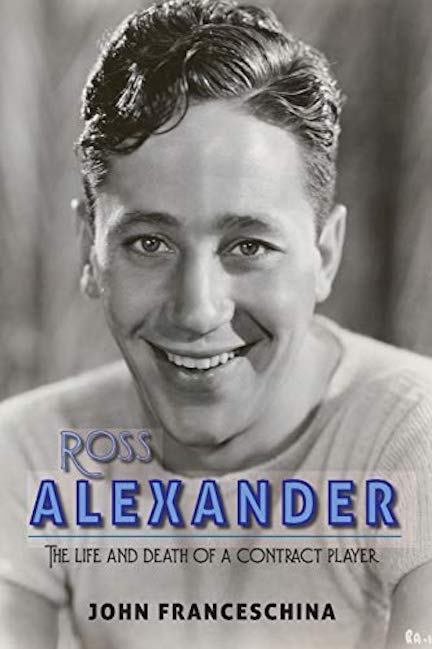
To my amazement there is a book on the tragic star- Ross Alexander (The Life and Death of a Contract Player) by John Franceschina (Bearmanormedia.com). It’s a diligently detailed examination of his life and meteoric career rise and heart-breaking fall. It also weeded through many of the false, supposedly factual, details of his life that can be found online and in books. Typically, Kenneth Anger in Hollywood Babylon got it wrong, stating that Ross Alexander took his own life with sleeping pills, whereas the reality was much more lurid and heartbreaking.
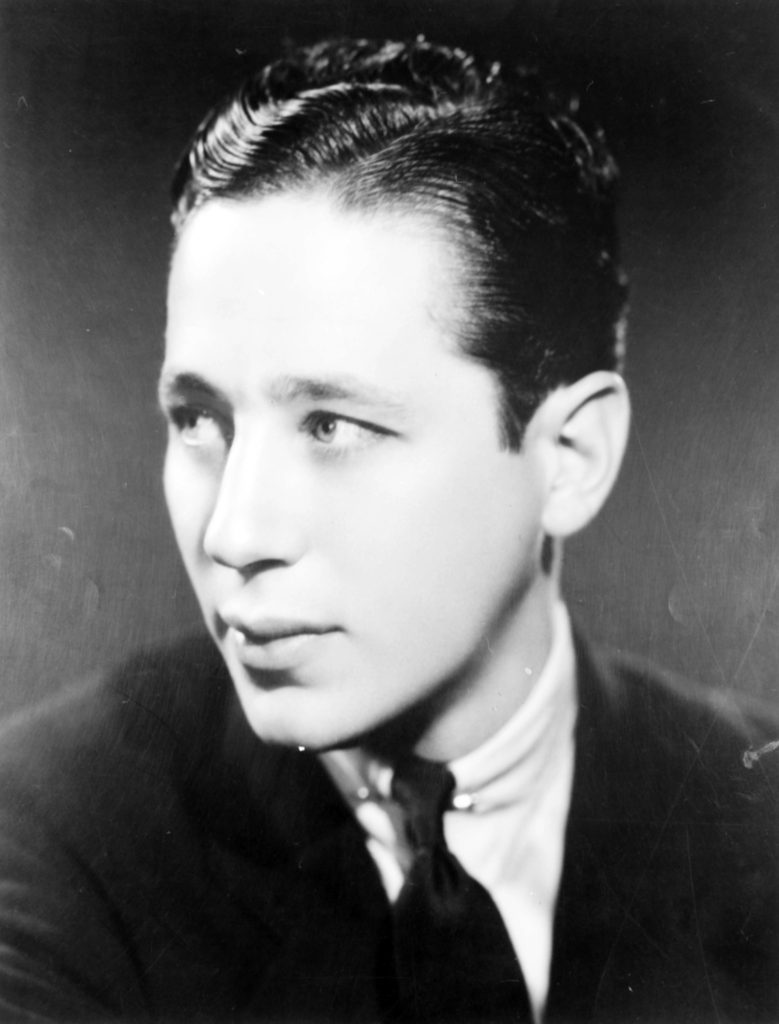
Ross Alexander was born in Brooklyn, NY in 1907. He was heavily involved in his high school’s theatrical productions, but often threw tantrums if he wasn’t allowed to perform his role the way he wanted. He caused a teacher who helped coach him after school to burst into tears. He later showed up at her door begging her forgiveness, offering her his prize possession- a green ever-sharp pencil.
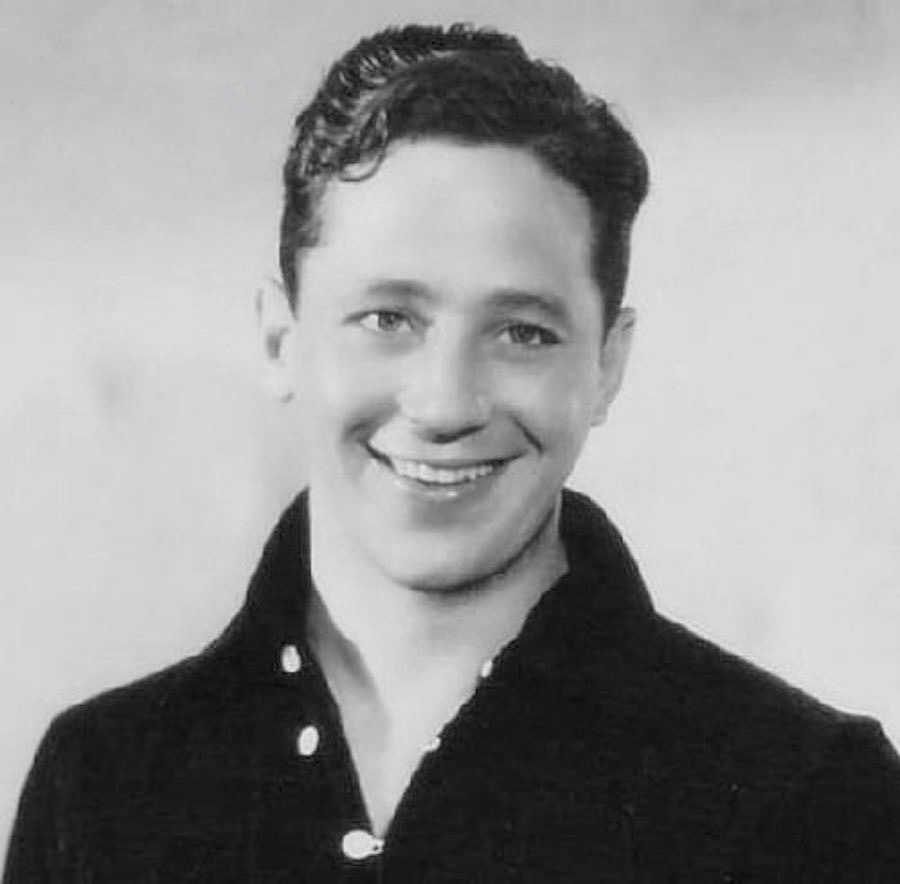
After finishing school, Ross joined the Boston Repertory Theater company, where he shone in many small roles, acting alongside Peg Entwistle (who famously leapt to her death from the Hollywood sign in 1932). Alexander was asked to be in a Broadway-bound production of a play called The Ladder. It was postponed because of re-writes, so Alexander traveled to Louisville and joined the Wright Players, where he appeared in 63 performances of 7 different plays. He returned to NY to perform in the newly rewritten production of The Ladder, an ambitious drama that touched on reincarnation, which became “the longest-running, most-expensive flop of its generation.”
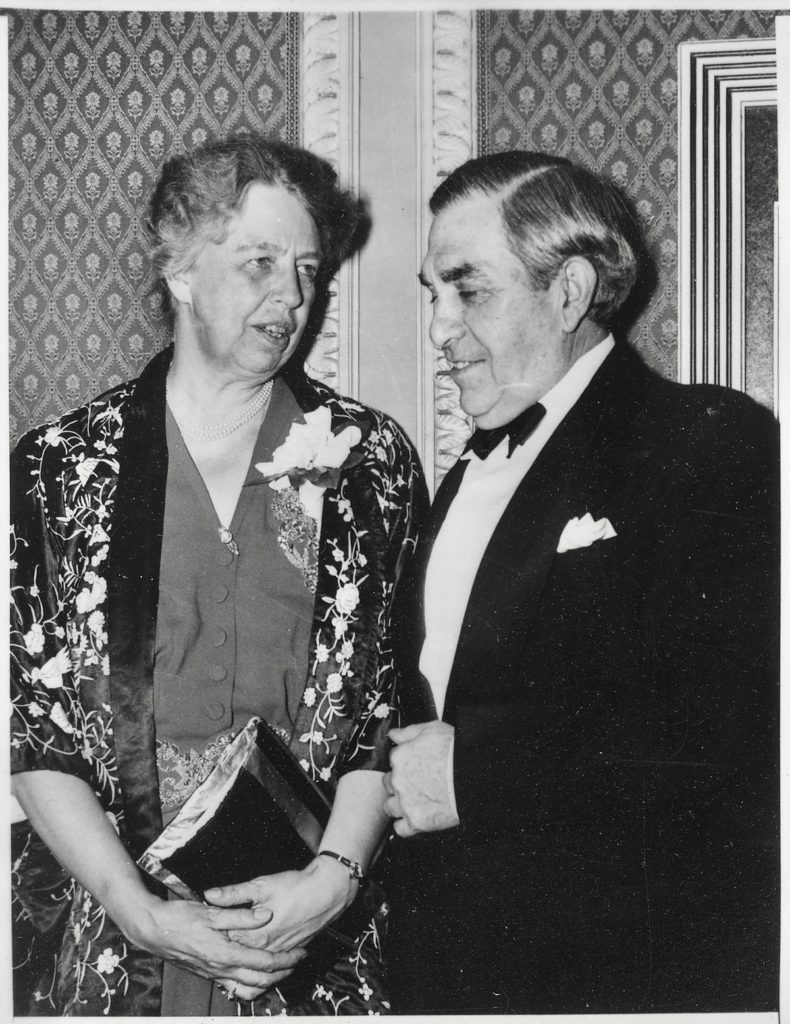
Ross married a vaudeville actress six years older than him- Helen Burroughs– in 1928, but he also met John Golden, a songwriter, playwright, producer and director, who took a special interest in Alexander and encouraged him to leave The Ladder and take another upcoming play. Alexander’s relationship with a man 33 years-older has been heavily speculated as more than “mentorship,” and in letters to Golden, Ross affectionately called him “Unk.” Alexander was hit by a car in an accident that left him laid up for some time and having to endure extensive plastic surgery which depleted his bank account. When he recovered, Ross joined the cast of Let Us Be Gay, but the Wall Street Crash closed it on Broadway. He did join the road company which opened the play in Chicago. Alexander relished in the freedom from his married life and hung out at the gay-friendly Dill Pickle Club, where he could “rub shoulders with artists, jazz musicians and gangsters.” After a seasonal stint at a summer theater in Falmouth, Ross returned to New York for rehearsals of After Tomorrow and instead of staying with his wife camped out at John Golden’s 58th Street Theater. Golden placed Alexander in another Broadway-bound production That’s Gratitude where Ross got glowing reviews. A series of productions marked a huge leap in Alexander’s career, his picture popping up in New York papers.
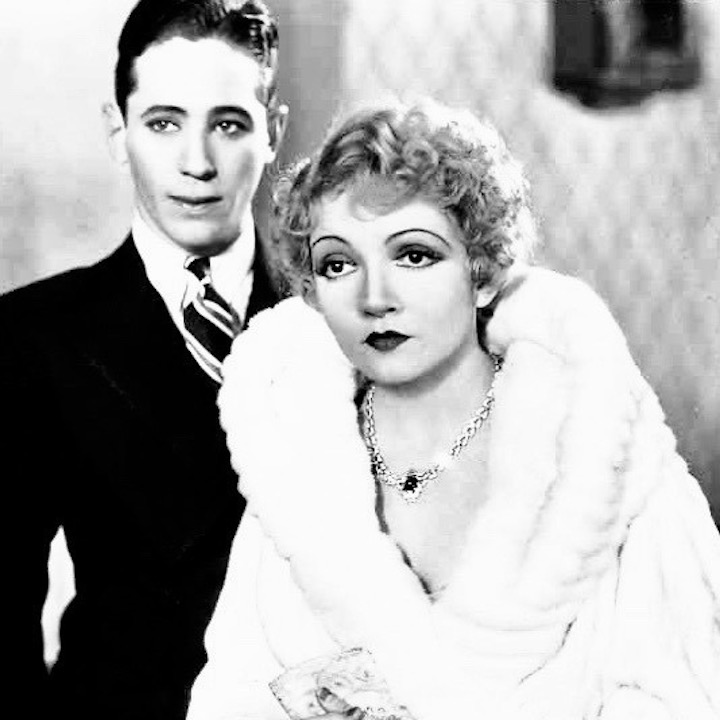
A surprise contract from Paramount pictures enabled Ross to divorce his wife. He joined the cast of The Wiser Sex which starred Claudette Colbert, Melvyn Douglas and Franchot Tone. “It was the worst picture ever produced!” Ross described. “Ask Claudette if you don’t believe me.” He became friendly with gay publicist Jerry Asher, who became his confidante about his sexually conflicted life. The Wiser Sex opened to middling reviews and poor box office but Ross hung around the Paramount lot with the likes of Cary Grant, Jeanette MacDonald and George Raft. But he missed the thrill of a theater audience and returned to New York.

John Golden came to his rescue again and let Ross sleep on a cot at the 58th Street Theater. Alexander bounced from production to production getting decent notices. He headed to Astoria to shoot the movie Social Register (1934) where he played a free-loading saxophone player. Back to Broadway John Golden bought the rights to The Wooden Slipper and put Ross in the lead where he got the finest notices of his career playing a Paris chef. After his next play- No Questions Asked– Ross was signed by MGM on a six-week option. There he got married again- to Aleta Freel, a NY debutante-turned-actress he met when he worked summer stock in Falmouth. It appealed to Ross be on the arm of a well-regarded actress and socialite. Aleta was also testing at Warner Brothers at the time. MGM didn’t even get around to his screen test until the last week of his option. Then Ross was called into an executive office and asked “Did you see your test, Mr. Alexander?” to which he replied he had. “Then tell us, if you were a producer, what would you pay that actor?” “About fifty cents a week,” he said and the executive agreed.
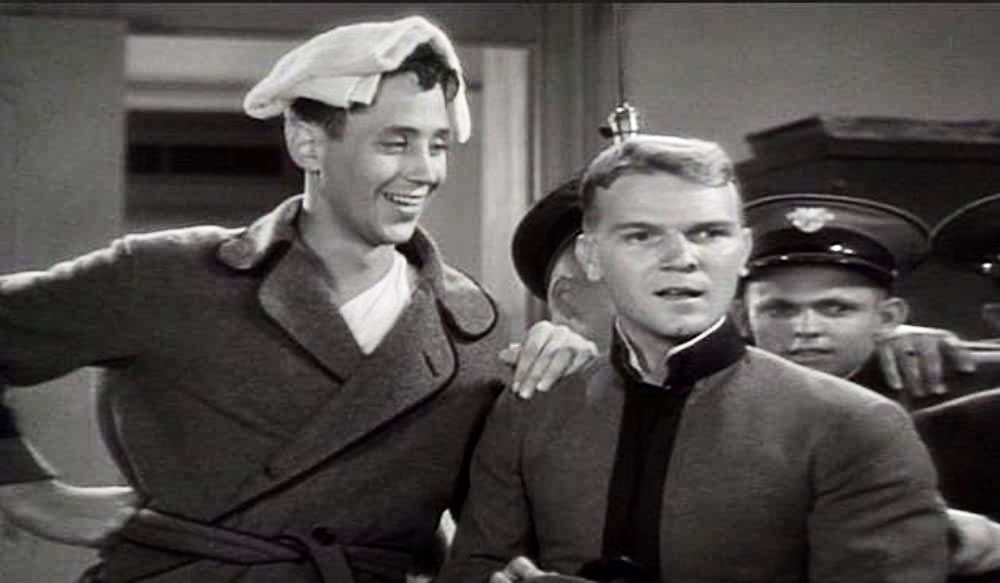
Luckily Ross was called to Warner Brothers for a test for a role in a West Point musical comedy Flirtation Walk starring Dick Powell and Ruby Keeler. Ross played the jocular, good-natured West Point roommate of Dick Powell in the film. Just Out of College (which was changed to Gentlemen are Born) followed, about four friends who head to New York after college only to find Depression-era hardships. Ross played an aspiring architect in a film that included Franchot Tone, Dick Foran and Ann Dvorak. Ross received favorable reviews for both films.
Maybe It’s Love was based on the Maxwell Anderson play Saturday’s Children. Ross and Gloria Stuart play a couple involved in a rocky relationship. Speaking of rocky relationships. Alexander and wife Aleta were not having a smooth marriage. Ross was bristling under the guidelines of being a “contract player” but still getting roles. Alelta had not even screen tested yet and yearned for the bright lights of Broadway where she was adored. Meanwhile Ross was often showered with praise in reviews and important columnists like Louella Parsons often championed him. Alexander’s fan mail grew.
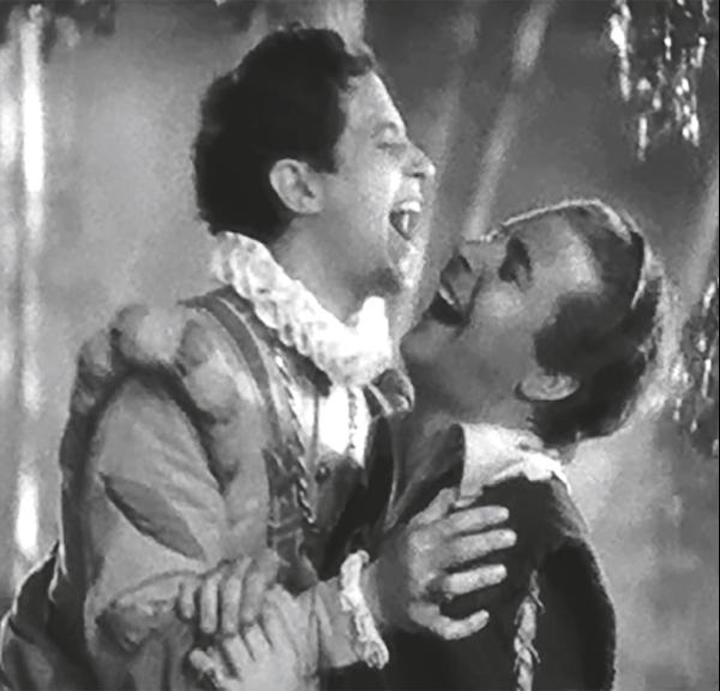
Ross had the good fortune to join the cast of A Midsummer’s Night’s Dream, an all-star extravaganza, imaginatively directed by German director Max Reinhardt and William Dieterle. Mickey Rooney played Puck, Olivia de Havilland played Hermia, Ross Alexander played Demetrius, James Cagney as Bottom, Dick Powell as Lysander. The film was bursting with comedy and visual sumptuousness, adding a fairy-tale like lyricism. While the reviews for the film were mixed, Ross was always singled out positively, even though personally Alexander considered the movie a failure- he hated the costumes and direction. Fortunately, the film only improves with age- it truly is magical fun.
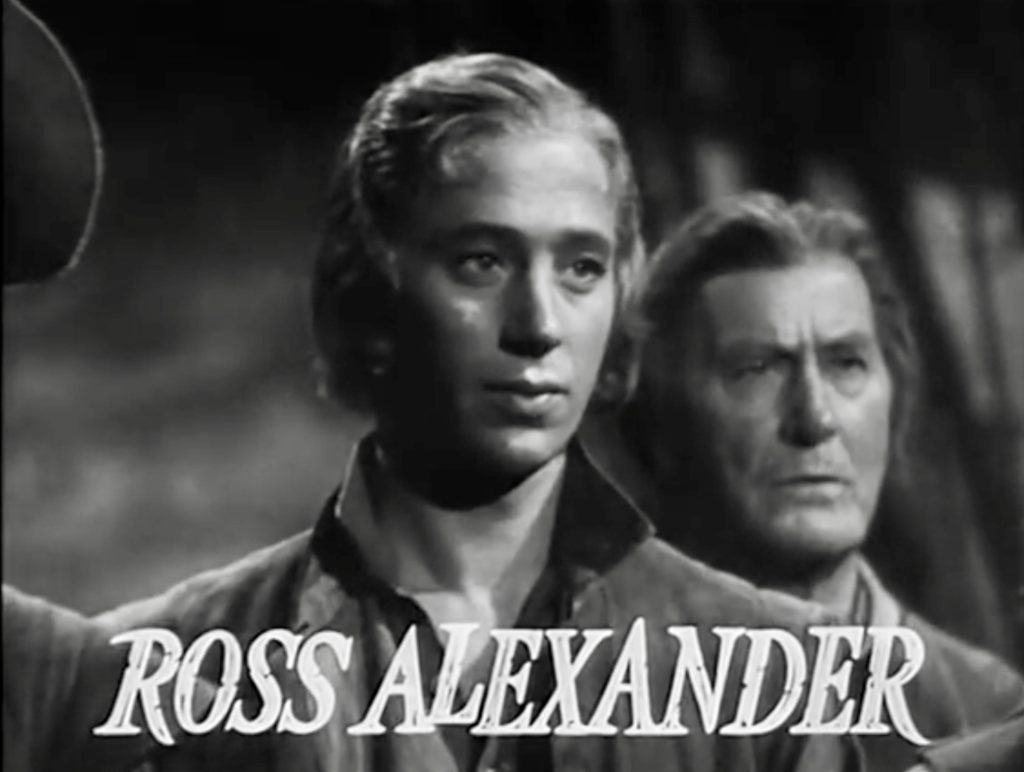
Alexander was the fifth lead in Warner Brothers’ rousing swashbuckler Captain Blood with dashing Errol Flynn as English physician Peter Blood- unjustly imprisoned and sold into slavery in the West Indies. He and his rebel crew escape and commandeer a Spanish ship, vowing to roam the Caribbean as pirates. “It’s the world against us and us against the world.”
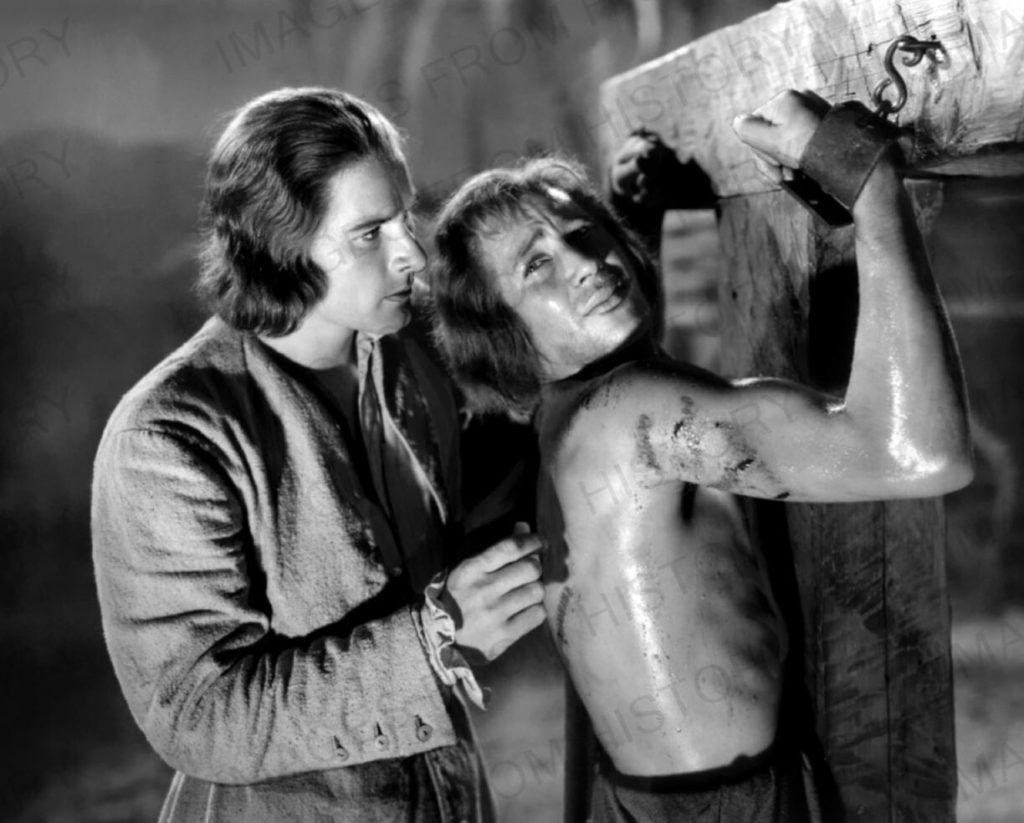
In a film filled with unbridled sadism and hints of homoeroticism, Alexander plays Jeremy Pitt, a ship navigator and loyal friend to Peter. When Pitt is tied up and whipped, Peter Blood attends his wounds with loving care. In fact, Flynn fought the studio to leave in Alexander’s underarm hair during that scene. There’s a sequence where Peter is tenderly wrapping gauze to a wound on Jeremy’s leg and Lionel Atwill, as the brutal Colonel Bishop, enters and says, “What’s going on between you two?” According to David Bret in his biography Errol Flynn: Satan’s Angel– Flynn and Ross became lovers during the making of the film. And in an article by Lou Lumenick in the NY Post “Errol Flynn and Franchot Tone were among the few mourners at Ross Alexander’s funeral and were reputed to have spent the night together in memory of the love they shared.”.
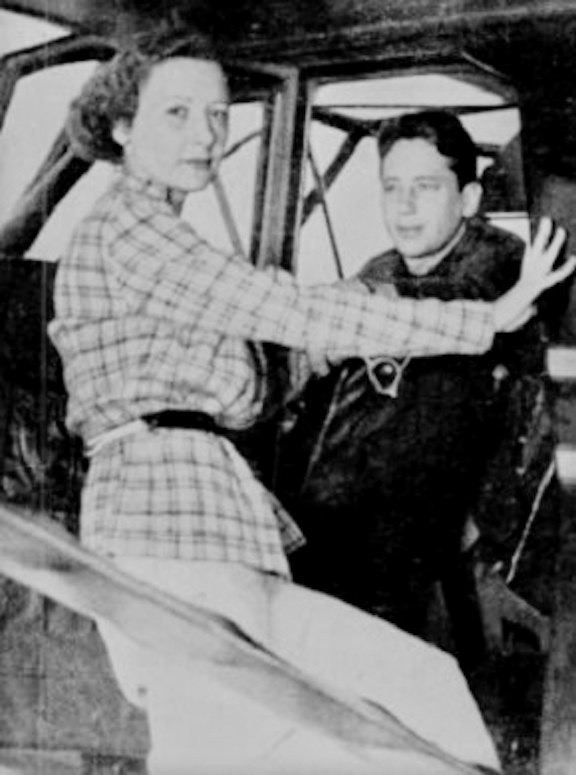
As Alexander’s career flourished, his wife remained frustrated and depressed at her stalled career. According to Ross he came home one night and his wife Aleta was threatening to return to New York and her theatrical roots to which Alexander callously replied “Well, for God’s sake go back and quit nagging me about it.” After the couple went to bed Aleta rose, took a rifle from the gun rack, came outside on the front lawn and shot herself in the head. She died the following morning at Lebanon hospital. Others in Hollywood suggested Alexander’s many trysts with men helped send her over the edge and her father, who had always hated Alexander, and accused him of emotional cruelty, demanded a full inquest. After a brief deliberation, the six-man jury returned with a verdict of suicide. Ross was devastated and guilt-ridden over the incident and was given little time to grieve- he was back at the studio filming Brides Are Like That right after the inquest because he was contractually bound.
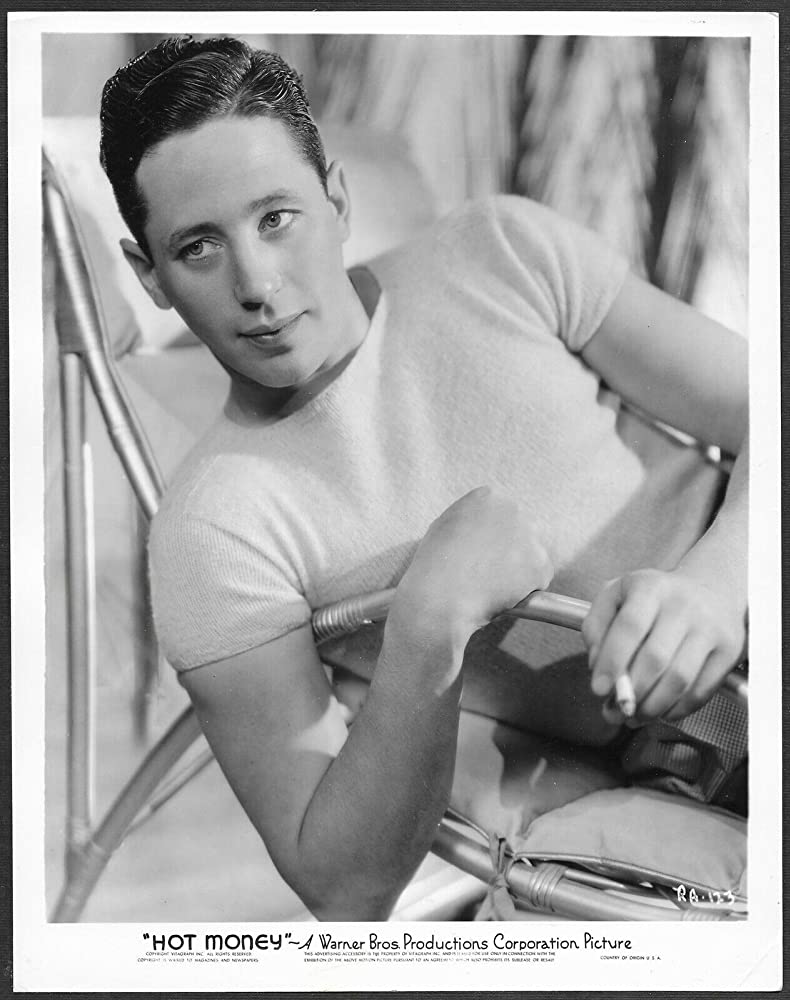
Now here’s where Ross’s career and life skidded off the rails. His alcoholism ramped up and he was arrested for public intoxication in front of the Trocadero Club where the actor was engaged in a heated argument with a parking lot attendant (that he was rumored to have been trying to pick up). Ross was put in a holding cell for several hours before making bail. Barely having time to get over the hangover he was back at the studio shooting the comedy Hot Money. Ross was still violently shaken to the core over Aleta’s suicide.
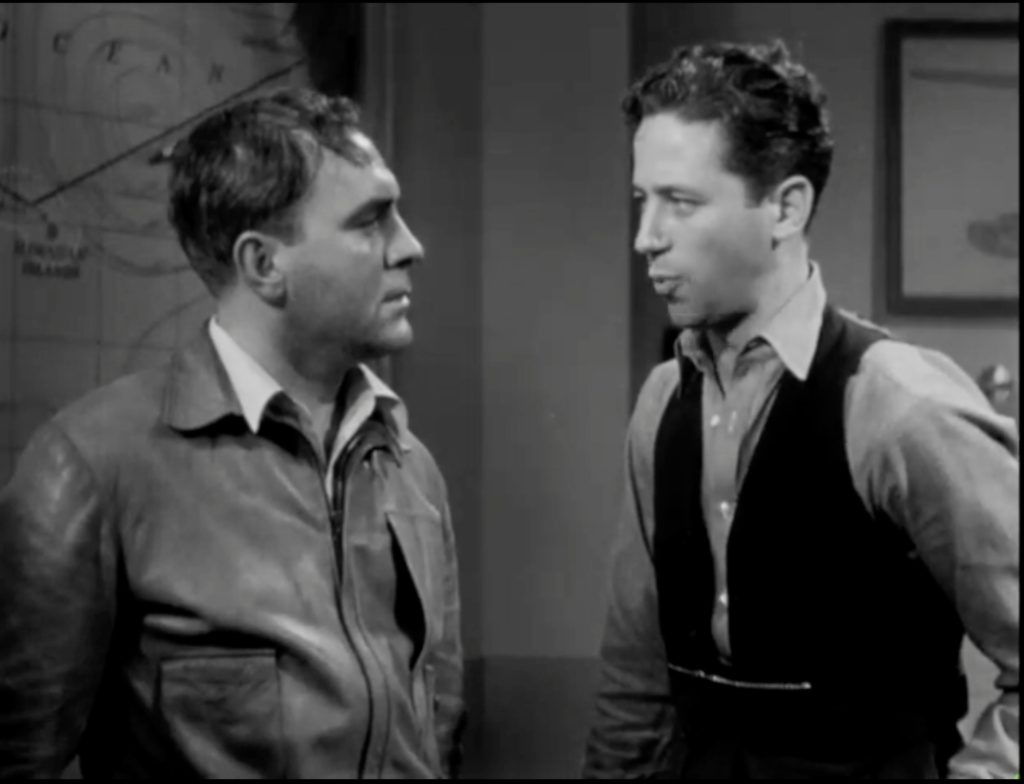
China Clipper starred Pat O’Brien as a man attempting to make a plane that could fly from China to San Francisco. Ross Alexander plays his pilot buddy who teams up with him. Humphry Bogart shows up as another pilot flying mail from Key West throughout the Caribbean. Reviews were strong for the film: “Splendid team work by director, cast and producer turns this aviation saga into gripping entertainment that should hold any audience.” Ross attended the premiere with contract player Anne Nagel, who he had performed with in Hot Money.
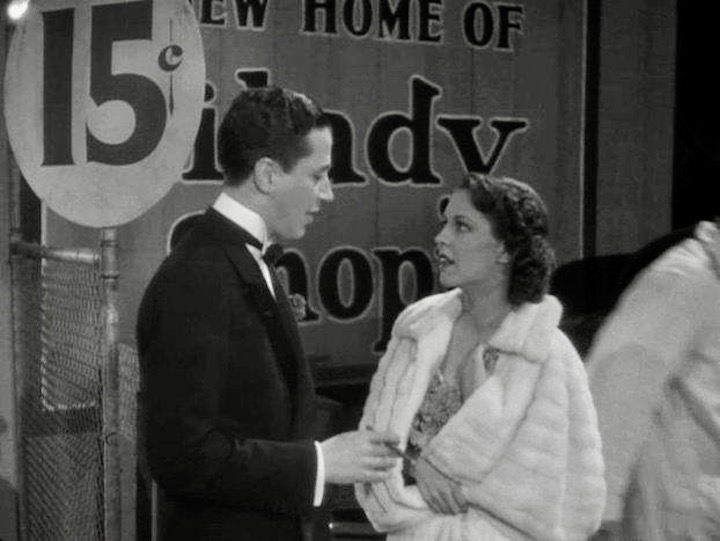
Alexander co-starred with Nagel in his next film Here Comes Carter. In the film, Ross stars as a movie publicist who transforms into a mean Walter Winchell-style radio gossip columnist. On a September day after the shooting of that film, Anne & Ross hopped a plane for Yuma, Arizona and were married by a Justice of the Peace. Nagel was brought up quite religious- she even considered the convent in her youth, but after her parents’ divorce and moving to Hollywood with her mother, she became interested in acting. “Please don’t call our marriage a second chance at happiness for this is a new adventure Anne and I have just begun.” Ross told the press. While Alexander’s homosexuality was common knowledge in Hollywood, he seemed devoted to Anne. At first. Then his moodiness re-appeared. The drinking increased, and he began going off in the house alone to write poetry.
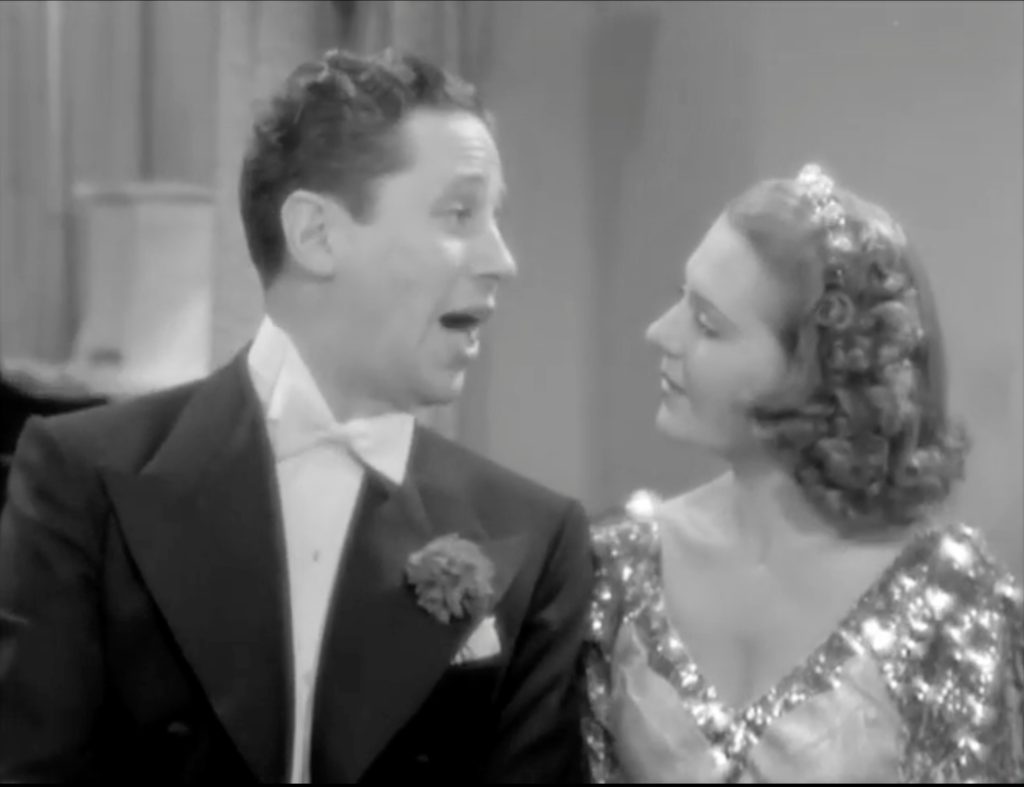
Alexander, whose career, in the beginning, was building towards bigger and better roles, now seemed mired in frothy musical comedies that Dick Powell turned down. Whether the Studio wearied of covering up his homosexual antics or not, the parts offered him were hardly A-material and Ross suffered because of it. His next film was Ready, Willing and Able, co-starring Ruby Keeler, a tuneful bit of fluff where Alexander and Lee Dixon play two songwriters who try to get a famous British singer for their musical. Ruby Keeler is mistaken for the star and the show goes into rehearsal- until the actual star (Wini Shaw) shows up. It all ends well with a fabulous number- “Too Marvelous for Words” which Alexander performs with wit, style and good humor.
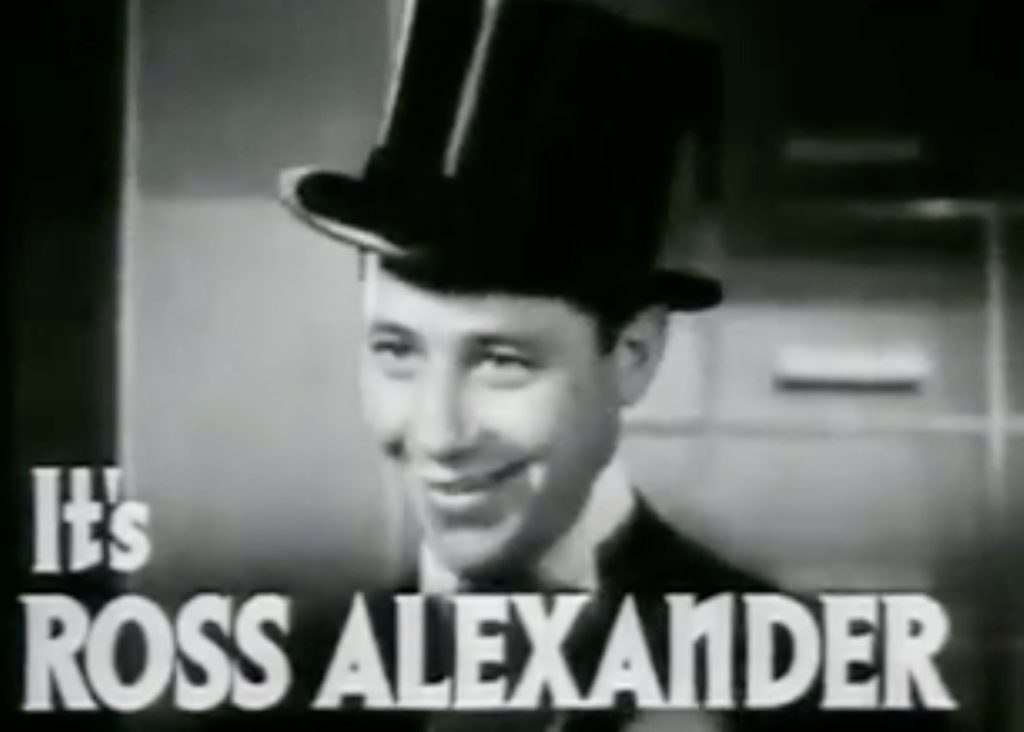
Ross finally reached out to his old “mentor” John Golden, who he lost touch with ever since he arrived in Hollywood. In a surprisingly revealing letter he stated to John, “the years I spent with you are among the happiest times I’ve ever known in my short and eventful life. I can certainly wish I were able to go back and enjoy them all again.”
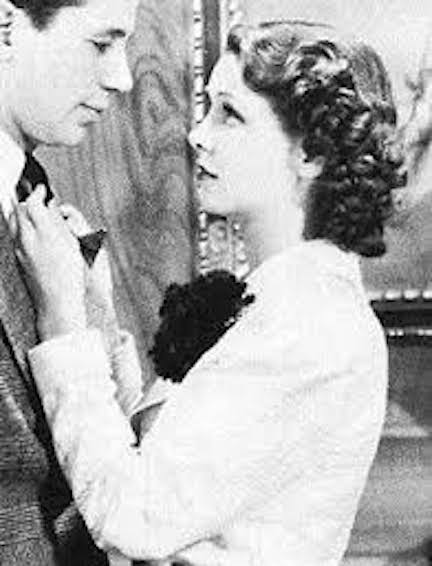
Anne & Ross invited their parents to spend Christmas with them which was exhausting. But after the dishes were washed and the in-laws were in bed Ross said to his bride, “I’ve never brought happiness to anyone, Anne, but I’m going to turn over a new leaf and make you the happiest woman in the world.” On Jan. 2nd, the couple had spent an ordinary day playing badminton and taking down the Christmas tree. Ross said he wanted to write poetry. After telling his servant to call him for dinner, Ross walked to the barn with a .22 caliber target pistol. After a shot was heard, Ross’s body was discovered up in the hayloft, slumped over. He had shot himself in the head. It was thirteen months after Aleta Freel’s similar suicide. He was only 29 years old.
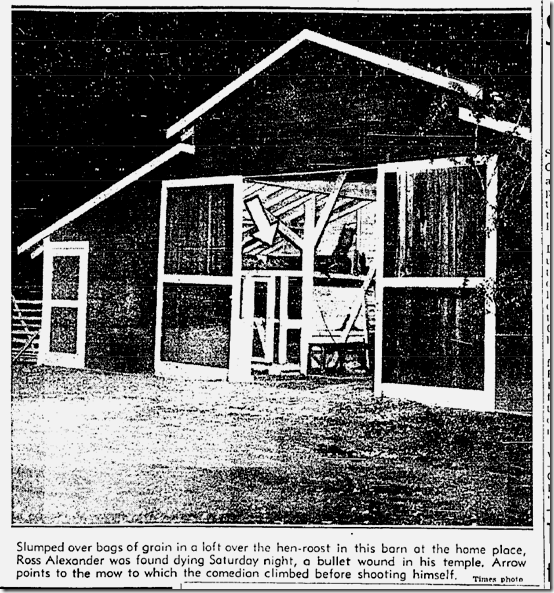
Warner Brothers immediately sent their people over to the house who rounded up all of Ross’s letters, poetry and any other correspondence that might cause more controversy. His death rocked Hollywood. On Jan. 8th Ross’s body was given an open coffin funeral at the Little Church of the Flowers within the grounds of Forest Lawn Memorial Park. In her syndicated column Harrison Carroll wrote, “Ross Alexander is now in his grave. Only a few of the late star’s friends knew that he had been carrying a heavy financial load- debts contracted during a long period…” True, Alexander left very little of an inheritance. There was an insurance policy, but there was a suicide clause where he pledged that he wouldn’t take his life for two years after the policy was signed. Had Ross postponed his suicide for a few months he would have left his beneficiaries much more. And even though Warner Brothers excised Ross Alexander from the trailers for Ready, Willing and Able, the reviews were good. The Hollywood Spectator wrote, “For Hollywood its gaiety is dampened somewhat by the presence of the late Ross Alexander in the cast, the feeling of regret being accentuated by the fact that his performance is the best he gave on the screen.”
Why did Ross Alexander kill himself? Who knows? There was another documented story that Ross had picked up a male hobo, had sex with him and the man went to Warner Brothers threatening blackmail. Whether Alexander feared he could not survive this kind of a homosexual scandal- especially affecting his wife and family, we’ll never know. But to watch the talented actor on the screen with his joyful, boyishly handsome, good cheer is to be saddened at what was never to be.
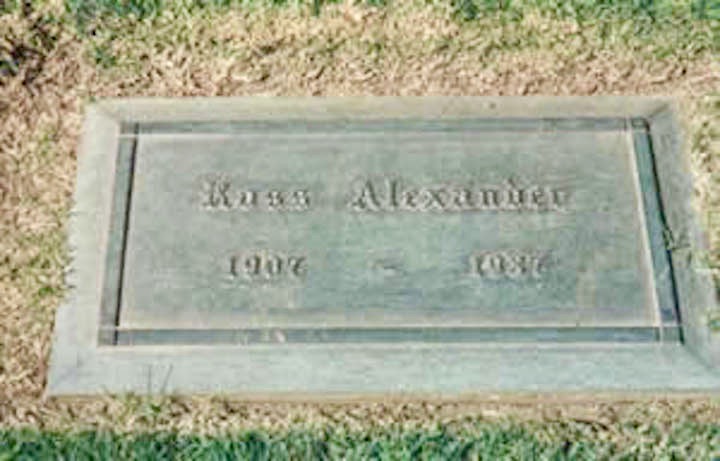

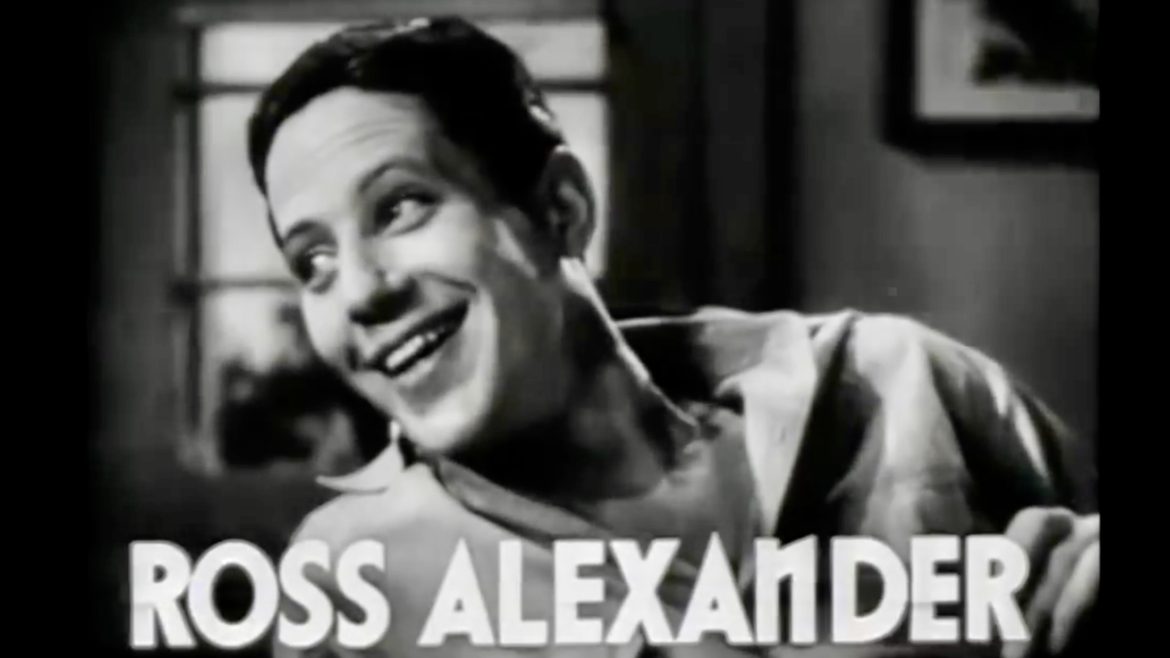
This is one of the saddest Hollywood stories I’ve ever read.
In the 70s and early 80s I lived in Santa Monica in several seedy bungalows originally built in the 20s.
I often thought of the star struck young people who came before me and lived in these places during the Depression. Perhaps Ross Alexander shacked up in one of them.
Great research job, Dennis !
Great story Dennis. I too lived in LA and in the house that Joe Kennedy bought for his mistress on Formosa I think. The tour bus use to stop in front blaring the history of their story. I would lean out the window and sometimes yell..Hi, I’m her her great granddaughter 🤪😁